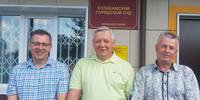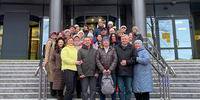The Case of Poltoradnev and Others in Solikamsk
Filter
- #
Vladimir Poltoradnev's telephone conversations are being tapped.
- #
Sergey Kanafyev, senior investigator of the Solikamsk Investigative Committee, is initiating a criminal case under Part 1 of Article 282.2 of the Criminal Code against unidentified persons.
- #
Searches are underway at 4 addresses in Solikamsk. 6 believers are taken to the offices of law enforcement agencies. At least one of the search warrants is issued by investigator Kanafyev.
It becomes known that a criminal case under Part 1 of Article 282.2 of the Criminal Code of the Russian Federation was initiated against 51-year-old Vladimir Timoshkin and 47-year-old Alexander Sobyanin. Poltoradnev, Timoshkin and Sobyanin are placed in a temporary detention facility.
- #
Vladimir Poltoradnev is charged with committing a crime under Part 1 of Article 282.2 of the Criminal Code of the Russian Federation. During interrogation, the believer denies his guilt.
- #
The Solikamsk City Court of the Perm Territory releases Aleksandr Sobyanin from the temporary detention facility and chooses a preventive measure against him in the form of a ban on certain actions.
- #
Judge of the Solikamsk City Court of the Perm Territory Margarita Tsyruleva, following the results of a closed session, decides to change the measure of restraint for Vladimir Poltoradnev from house arrest to a ban on certain actions. The decision is motivated by the fact that Poltoradnev needs fresh air for health reasons, and also asks to be allowed to work to support himself. The new measure of restraint includes a ban on communication with other defendants in the case, on sending and receiving letters, as well as on the use of any means of communication other than to call emergency services.
- #
Lyubov Oshmarina, judge of the Solikamsk City Court of the Perm Territory, replaces house arrest for Vladimir Timoshkin with a ban on certain actions. This is due to the fact that the accused is the sole breadwinner, his wife does not work and takes care of her elderly mother, and Vladimir has a dependent daughter. The believer has no right to leave Solikamsk and communicate with other defendants in the case.
- #
It becomes known that the case was transferred to another investigator - Alexander Novikov.
- #
Vladimir Poltoradnev is re-prosecuted as a defendant in organizing the activities of an extremist organization.
Lieutenant Colonel of Justice A. A. Novikov, investigator of the Department of Internal Affairs of the Investigative Department for Solikamsk of the Investigative Directorate of the Investigative Committee of the Russian Federation for the Perm Territory, hands over the corresponding resolution to the believer. The document states that the suspect, as well as other persons, "created a real threat to the violation of the rights, freedoms and legitimate interests of an indefinite circle of persons, and also caused harm to the interests of society and the state." According to the investigation, Poltoradnev's guilt lies in the fact that he "directly participated in religious meetings ... discussed with his followers questions and topics of a religious nature."
- #
The case goes to the Solikamsk City Court of the Perm Territory. It will be considered by judge Yevgeny Sergeev.
- #
The court establishes the identities of the defendants. The indictment is read out. The judge grants the motions to record the hearing, but rejects the defendants' refusal of appointed lawyers.
The defense asks for additional time to familiarize itself with the volumes of the case. The court rejects this petition.
The defendants read out their attitude to the charges.
- #
18 people come to support the believers.
Prosecution witnesses, including operatives, are being questioned. They answer most questions evasively. Thus, one of them does not remember what means were used for surveillance and whether investigative measures were stopped against the defendants. Another witness does not know what beliefs the defendants hold, but he says he followed them on orders.
The last witness says that he is familiar with the defendant Vladimir Poltoradnev and speaks positively about him.
- #
20 people come to the hearing.
The court examines prosecution witnesses. One of them, an employee of Poltoradnev, replies that he was "not involved" in anything. The defendant's former boss says of him: "Excellent worker! There are no complaints about him."
Another witness speaks positively about Alexander Sobyanin, who works for him.
- #
The state prosecutor reads out the case materials, including the protocols of interrogations of witnesses who did not appear in the courtroom.
A prosecution witness who had previously attended worship services of Jehovah's Witnesses is being questioned. He reports that the religious group that existed in Solikamsk was never a structural unit of the LRO or the Administrative Center of Jehovah's Witnesses in Russia. The witness also says that the LRO existed only for administrative and economic needs, for example, to rent premises for worship.
Audio recordings of telephone conversations of the defendants are reproduced in court. Alexander Sobyanin declares that the voice attributed to him does not really belong to him.
Further, many positive characteristics of the defendants from their employers, colleagues, neighbors and relatives are announced.
- #
19 people come to support the believers.
Material evidence is being examined. Vladimir Poltoradnev asks the court to hear all audio recordings on discs, and not just its individual parts, since this way the understanding of the entire material is lost.
During the examination of material evidence, it was revealed that the integrity of the packaging of the system units belonging to the defendants was violated. The believers intend to petition for the inadmissibility of these materials as evidence of their guilt, since they do not exclude falsifications.
Vladimir Poltoradnev declares that he does not own the literature presented, which was attached to the case file as material evidence of his guilt.
- #
An audio recording of a worship service is played in court, where an Gospel episode from the life of Jesus Christ is discussed.
Sobyanin and Timoshkin say that at least some of the remarks attributed to them are made by other people. The defendants draw attention to the fact that at the beginning and end of the recording there is a song and a prayer, which once again proves that this is a divine service, and not a meeting of legal entities.
- #
Lawyers file motions about the inadmissibility of evidence and their exclusion from material evidence. A motion to return the case to the prosecutor is also filed. The court attaches all petitions, but notes that they will be considered at the stage of additions.
Witnesses in the case are being questioned. The first witness says that he knows Timoshkin, and characterizes him as an honest, decent and kind person. It distinguishes between the activities of legal entities and ordinary believers. The witness says that until 2017, the council of the LRO met once a year to resolve administrative and economic issues, but not to hold religious meetings. He tells how Jehovah's Witnesses conduct worship services: they sing religious songs, pray, read the Bible. The witness notes that there were no calls for extremism at their meetings.
Alexander Sobyanin's daughter is being interrogated. She stresses that the religion of Jehovah's Witnesses is not prohibited. They have a good relationship with their father. Characterizes him as a conscientious worker, family man and good friend.
The interrogation of the defendants begins.
- #
Excerpts of audio files are listened to, on which conversations of believers are recorded. The defendants refuse to comment on the recordings, as their voices are not there.
The defense draws attention to a gross violation of the procedure for examining evidence on the part of the prosecutor, who listens to some audio files from the case materials on her own with headphones, although this should take place jointly with all participants in the process, including the judge.
- #
The prosecutor requests 6 years in prison for Vladimir Timoshkin and Vladimir Poltoradnev, and asks Aleksandr Sobyanin to replace Part 1 (organization of extremist activity) with Part 2 (participation) of Article 282.2 of the Criminal Code of the Russian Federation and sentence him to 3 years in prison.
- #
Believers deliver the last word.
Defendant Alexander Sobyanin's last word in Solikamsk The Last Word of the Defendant Vladimir Poltoradnev in Solikamsk The Last Word of the Defendant Vladimir Timoshkin in Solikamsk - #
- #


